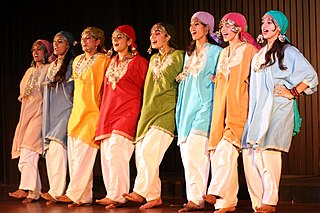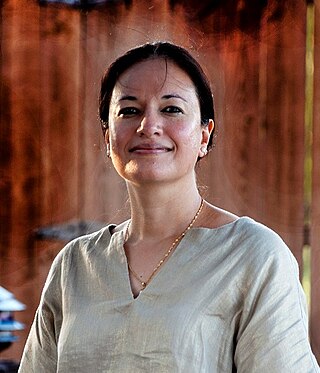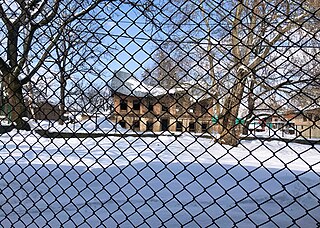
Azad Jammu and Kashmir abbreviated as AJK and colloquially referred to as simply Azad Kashmir, is a region administered by Pakistan as a nominally self-governing entity and constituting the western portion of the larger Kashmir region, which has been the subject of a dispute between India and Pakistan since 1947. Azad Kashmir also shares borders with the Pakistani provinces of Punjab and Khyber Pakhtunkhwa to the south and west, respectively. On its eastern side, Azad Kashmir is separated from the Indian union territory of Jammu and Kashmir by the Line of Control (LoC), which serves as the de facto border between the Indian- and Pakistani-controlled parts of Kashmir. Geographically, it covers a total area of 13,297 km2 (5,134 sq mi) and has a total population of 4,045,366 as per the 2017 national census.
Literature of Kashmir has a long history, the oldest texts having been composed in the Sanskrit language. Early names include Patanjali, the author of the Mahābhāṣya commentary on Pāṇini's grammar, suggested by some to have been the same to write the Hindu treatise known as the Yogasutra, and Dridhbala, who revised the Charaka Samhita of Ayurveda.
Lalleshwari, also commonly known as Lal Ded, was a Kashmiri mystic of the Kashmir Shaivism school of Hindu philosophy. She was the creator of the style of mystic poetry called vatsun or Vakhs, meaning "speech". Known as Lal Vakhs, her verses are among the early compositions in the Kashmiri language and are a part in the history of modern Kashmiri literature.

The Kashmiri Pandits are a group of Kashmiri Hindus and a part of the larger Saraswat Brahmin community of India. They belong to the Pancha Gauda Brahmin group from the Kashmir Valley, located within the Indian union territory of Jammu and Kashmir. Kashmiri Pandits are Hindu Kashmiris native to the Kashmir Valley, and the only remaining Hindu Kashmiris after the large-scale of conversion of the Valley's population to Islam during the medieval times. Prompted by the growth of Islamic militancy in the valley, large numbers left in the exodus of the 1990s. Even so, small numbers remain.

The Kashmir conflict is a territorial conflict over the Kashmir region, primarily between India and Pakistan, and also between China and India in the northeastern portion of the region. The conflict started after the partition of India in 1947 as both India and Pakistan claimed the entirety of the former princely state of Jammu and Kashmir. It is a dispute over the region that escalated into three wars between India and Pakistan and several other armed skirmishes. India controls approximately 55% of the land area of the region that includes Jammu, the Kashmir Valley, most of Ladakh, the Siachen Glacier, and 70% of its population; Pakistan controls approximately 30% of the land area that includes Azad Kashmir and Gilgit-Baltistan; and China controls the remaining 15% of the land area that includes the Aksai Chin region, the mostly uninhabited Trans-Karakoram Tract, and part of the Demchok sector.

Munshi is a Persian word, originally used for a contractor, writer, or secretary, and later used in Mughal India for native language teachers, teachers of various subjects, especially administrative principles, religious texts, science, and philosophy and were also secretaries and translators employed by Europeans.

Kashmiris are an Indo-Aryan ethnolinguistic group speaking the Kashmiri language and originating from the Kashmir Valley, which is today located in Indian-administered Jammu and Kashmir.

Sharada Peeth is a ruined Hindu temple and ancient centre of learning located in the Neelum Valley of Pakistan-administered Azad Kashmir in the disputed Kashmir region. Between the 6th and 12th centuries CE, it was among the most prominent temple universities in the Indian subcontinent. Known in particular for its library, stories recount scholars travelling long distances to access its texts. It played a key role in the development and popularisation of the Sharada script in North India, causing the script to be named after it, and Kashmir to acquire the moniker "Sharada Desh", meaning "country of Sharada".
"I Protest" is a rap song by a Kashmiri singer MC Kash, that he sang in 2010. The song that is about the 2010 Kashmir Uprising and Human rights abuses in Kashmir and failures by Kashmiri politicians including the separatists. It became an immediate hit in the valley and outside. The song was sung during protests. The studio where the song was recorded was raided by the local police after the song was released and the staff was questioned about involvement of any separatist leader. Kash, who was emotionally disturbed by the deaths of youth, including his friend, in the unrest, wrote the song. According to Kash, he wrote this in English to spread awareness about the situation in Kashmir. Kash faced hard time in recording his songs after this song was released as most of the studios denied facilitating him and he felt considerable pressure to stop raising such issues in his songs after people close to him showed concern about his security.

Nyla Ali Khan is an adjunct professor at Oklahoma City Community College. She is a former Visiting Professor at the University of Oklahoma, Norman, and former Associate Professor at the University of Nebraska-Kearney. She is the author of four books, and several articles that focus on the political issues and strife of her homeland, Jammu and Kashmir, India. She is the granddaughter of Sheikh Abdullah.
The Kashmiri diaspora refers to Kashmiris who have migrated out of the Kashmir into other areas and countries, and their descendants.

The culture of Kashmir encompasses the spoken language, written literature, cuisine, architecture, traditions, and history of the Kashmiri people native to the northern part of the Indian subcontinent. The culture of Kashmir was influenced by the Persian as well as Central Asian cultures after the Islamic rule of Kashmir. Kashmiri culture is influenced by Hinduism, Buddhism and later by Islam.
Pro-Pakistan sentiment is fondness and love of aspects of Pakistani culture, Pakistani history, Pakistani cuisine, Pakistani traditions or the people of Pakistan.
Human rights abuses in Jammu and Kashmir range from mass killings, enforced disappearances, torture, rape and sexual abuse to political repression and suppression of freedom of speech. The Indian Army, Central Reserve Police Force (CRPF), and Border Security Personnel (BSF) have been accused of committing severe human rights abuses against Kashmiri civilians. According to Seema Kazi, militant groups have also been held responsible for similar crimes, but the vast majority of abuses have been perpetrated by the armed forces of the Indian government.

The Exodus of Kashmiri Hindus, or Pandits, is their early-1990 migration, or flight, from the Muslim-majority Kashmir valley in Indian-administered Kashmir following rising violence in an insurgency. Of a total Pandit population of 120,000–140,000 some 90,000–100,000 left the valley or felt compelled to leave by the middle of 1990, by which time about 30–80 of them are said to have been killed by militants.
K. N. Pandita, also known as Kashi Nath Pandita, is an Indian Kashmiri scholar in Persian and Central Asian Studies.

On 5 August 2019, the Government of India revoked the special status, or autonomy, granted under Article 370 of the Indian Constitution to Jammu and Kashmir—a region administered by India as a state which consists of the larger part of Kashmir which has been the subject of dispute among India, Pakistan, and China since 1947.

Shikara is a 2020 Indian Hindi-language romantic drama film produced and directed by Vidhu Vinod Chopra. The film is based on the Kashmiri pandit exodus of 1990. The story revolved around the love story of Shanti and Shiv Dhar, who are Kashmiri Pandits in the backdrop of the Exodus of Kashmiri Pandits from Kashmir. The book Our Moon Has Blood Clots by Rahul Pandita has inspired many parts of the movie.

The Kashmir Files is a 2022 Indian Hindi-language drama film written and directed by Vivek Agnihotri. The film presents a fictional storyline centred around the 1990 exodus of Kashmiri Hindus from Indian-administered Kashmir. It depicts the exodus and the events leading up to it as a genocide, a framing considered inaccurate by scholars. The film claims that such facts were suppressed by a conspiracy of silence.











